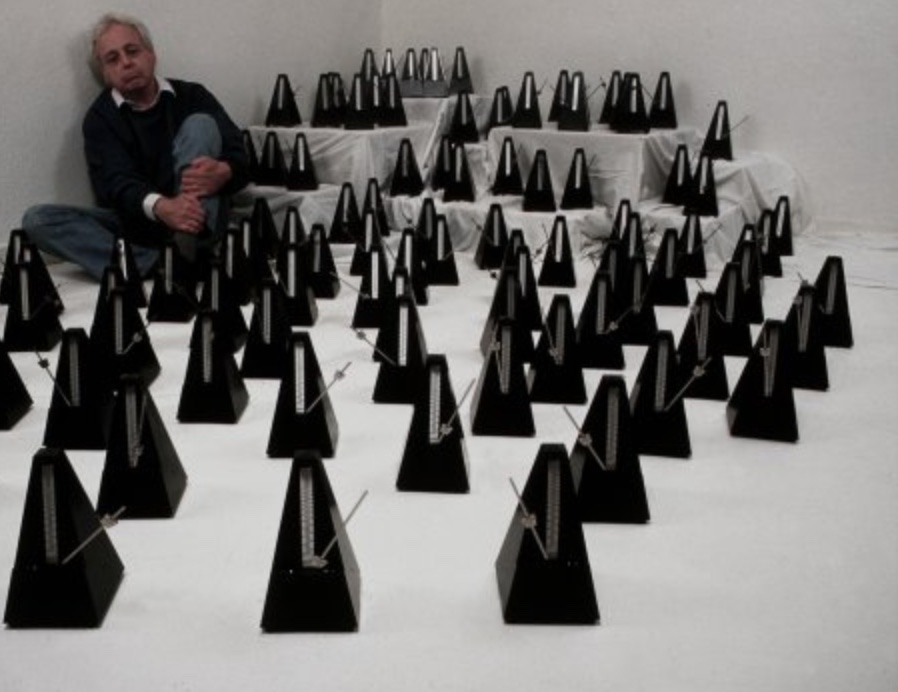by Mike Telin

Another is György Ligeti’s Poème symphonique for 100 mechanical metronomes. Written in 1962, during the composer’s brief association with the Fluxus movement, the piece calls for ten performers, each responsible for ten metronomes all of which are wound to their fullest extent and set to different speeds. Then, at the discretion of the conductor, the metronomes are set into action and the performers leave the stage and wait until the last metronome goes silent.
This summer ChamberFest Cleveland, which runs from June 14 through July 1, will present Ligeti’s quirky piece — which begs the question: how does one beg, borrow, or steal 100 windup metronomes?
Given that stealing is not a good idea, borrowing is the best option. But from whom? It turns out that San Francisco-based percussionist and composer Suki O’Kane owns 100 Wittner 6-inch metronomes and is willing to loan them to organizations and ensembles for the cost of shipping.
How did O’Kane become the keeper of 100 wind-up metronomes? “Some years back, there was a music nonprofit in San Antonio, Texas that owned them,” O’Kane said during a telephone conversation. “They were pretty successful at loaning them out and getting them back. But in the end it requires a lot of resources to do that, and I don’t know if they were able to make the math work given the amount of time they spent doing that.”
Enter the Berkeley Art Museum and Pacific Film Archive. “They were planning to do the Ligeti piece. But — they were not able to acquire 100 metronomes. What they could do was ask someone like me to buy them and then rent them out. And by selling them to me, the organization in Texas was able to relinquish the responsibility of loaning them to ensembles.”
O’Kane said her first concern was to create a business plan that would support the time and energy required to make them available. “I don’t charge anything for an ensemble to use them. I’ve had requests for 20 or even more than 100. I just say, let’s figure out what the shipping costs are going to be, and whatever that is will be the cost. But as a musician and an artist, it’s allowed me to meet all kinds of people. And it’s been a pleasure to see what people do with them — it’s not always the Ligeti.”
How many pieces call for wind-up metronomes? “I’m sure when Alarm Will Sound borrowed them, they were used in one of their own pieces. The Ojai Music Festival did a new piece that used them. That was great because we shipped them down and then took a vacation to go and see the piece and pick them up. So there was no expense shipping them back, and it only cost them a couple of comp tickets to the concert. We also got the backstage experience of collecting the metronomes from the performers and hearing what they had to say.”
O’Kane noted that while the metronomes are instruments, the process is about community building. “I am a student of collaborating with strangers — if you’re interested, I’m interested too. I encouraged the organizer for the Cleveland performance to not ask for all 100 metronomes but instead to ask the community to donate some of them. Because once an audience member shows up with a metronome, it creates another level of engagement and commitment to have those people there.”
Has O’Kane ever used the metronomes in one of her own projects? “I haven’t and that’s an interesting thing. It’s on the list — don’t we all have a bucket list of how to use 100 metronomes?”
A quick look at O’Kane’s website reveals that using art to create a “civil society” is what drives the percussionist’s work. “I grew up in a musical family, and the percussion thing was a total accident. When you’re the last of five kids, they had already grabbed whole families of instruments — the high brass were taken as were the strings. So my parents said, you could be a percussionist and we would feel lucky to have one in the house.”
She said that while she had great mentors, it was difficult to find ones that were female-identifying. “I was primarily a mallet percussionist and I think everyone expected that I would continue formal training. Because of my interest in community, I kind of walked away until I came back to it in a different way. But I’m inspired by the 100 metronomes and I’m focused on making sure they are accessible to the community.”
ChamberFest Cleveland is looking for metronomes! If you have a wind-up metronome, ChamberFest would love to borrow it for this performance of Ligeti’s Poème symphonique on Friday, June 30. Please contact the office at 216-471-8887 or info@chamberfestcleveland.com to arrange a pick-up. All metronomes will be returned to their owners after the festival ends.
Published on ClevelandClassical.com April 12, 2023.
Click here for a printable copy of this article



